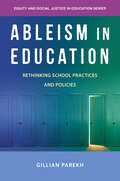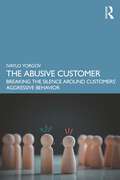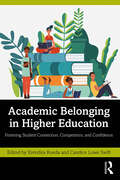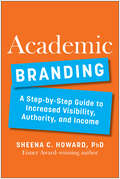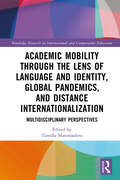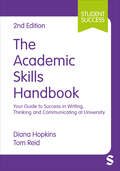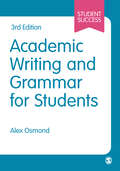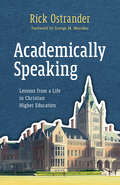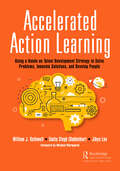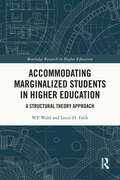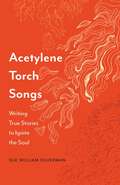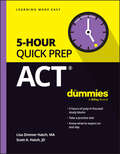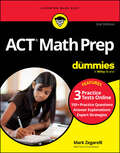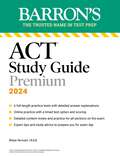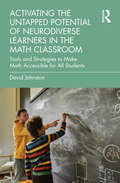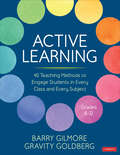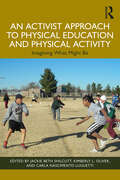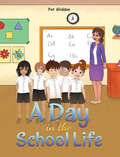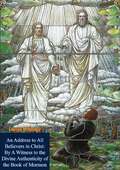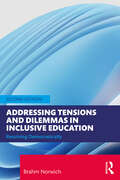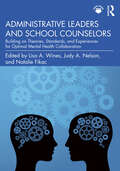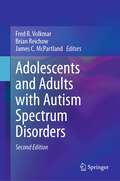- Table View
- List View
Ableism in Education: Rethinking School Practices and Policies (Equity and Social Justice in Education Series)
by Gillian ParekhHow we organize children by ability in schools is often rooted in ableism.Ability is so central to schooling—where we explicitly and continuously shape, assess, measure, and report on students’ abilities—that ability-based decisions often appear logical and natural. However, how schools respond to ability results in very real, lifelong social and economic consequences. Special education and academic streaming (or tracking) are two of the most prominent ability-based strategies public schools use to organize student learning. Both have had a long and complicated relationship with gender, race, and class.In this down-to-earth guide, Dr. Gillian Parekh unpacks the realities of how ability and disability play out within schooling, including insights from students, teachers, and administrators about the barriers faced by students on the basis of ability. From the challenges with ability testing to gifted programs to the disability rights movement, Parekh shows how ableism is inextricably linked to other forms of bias. Her book is a powerful tool for educators committed to justice-seeking practices in schools.
The Abusive Customer: Breaking the Silence Around Customers’ Aggressive Behavior
by Ivaylo YorgovBreaking the silence around an all-too-common problem, this book offers insights into the triggers of customer aggression against service employees, explores its consequences, and provides practical advice for handling abusive customers and mitigating the damage they inflict. Today, more than half of the world’s population is employed in the service sector. This fundamental economic shift is accompanied by heightened attention to customer service and the ‘customer is always right’ paradigm. But when customers act aggressively, everyone pays a price: frontline employees, their families, their companies, and even the abusive customers themselves. Unlike breezier titles on the subject, this book is based in academic research—exploring the ‘why?’ and ‘when?’ behind abusive behavior—that underpins its practical approach, illustrated with real-world stories from professionals on the front lines of customer service. The book’s useful tools include a sample anti-customer abuse policy and management process, a cheat sheet of practices that work for handling its consequences, a summary of effective service recovery processes and practices, and abuse-handling training list and curriculum templates. Managers and workers in customer-facing roles, in industries such as retail, hospitality, tourism, banking, and contact centers, will welcome this essential resource as part of their efforts to stop aggressive customer behavior, and improve employee morale, job satisfaction, and engagement.
Academic Belonging in Higher Education: Fostering Student Connection, Competence, and Confidence
by Eréndira Rueda Candice Lowe SwiftThe concept of belonging has been increasingly understood as the missing piece in diversity, equity, and inclusion efforts in higher education. This book explores the need to recognize and account for institutional-level factors that shape academic belonging, thereby improving student experience and outcomes. Though recent scholarship has identified several factors that are associated with student belonging in academics, there is little research that addresses what faculty can do in concrete terms to promote belonging, particularly in the domains where they have the most influence. The 12 chapters in this volume introduce readers to an array of collaborative, cutting-edge efforts to develop pedagogies, programs, strategies, and environments that help students develop academic belonging; that is, a sense of connection, competence, and confidence in academic domains. This book is written for higher education faculty, administrators, and researchers who wish to enhance their students’ sense of academic belonging by taking informed, practical measures to make them feel valued and supported.
Academic Branding: A Step-by-Step Guide to Increased Visibility, Authority, and Income
by Sheena HowardBecome a thought leader in your postgraduate field—and make money while doing so, with this step-by-step guide from an academic who has been there.Academic Branding gives academics and scholars the tools and strategies they need to position themselves outside of academia so they can reach the masses and make an impact—without the expense of a publicist. With the practices in this book, readers will build a powerful brand, become a public intellectual, and grow their audience with guidance from Sheena C. Howard, PhD. She&’s been where you are now, and she&’s ready to help you grow beyond what you imagine. With Dr. Howard&’s unique and thorough approach to success in the age of social media, you&’ll learn how to:Reframe the way you think about self-promotionIdentify your brand archetype and create a brand statementReach an audience beyond academia Build multiple revenue streamsGet your ideas (and content) to spreadCreate a movement around your expertise Land major media spots and speaking engagements In a world where anyone who is savvy online can turn themselves into a subject matter expert, it&’s important that we lift up and amplify the voices of actual subject matter experts. This guide will teach you how to reach the audience that needs your expertise most, building a brand and achieving financial freedom along the way.
Academic Mobility through the Lens of Language and Identity, Global Pandemics, and Distance Internationalization: Multidisciplinary Perspectives (Routledge Research in International and Comparative Education)
by Tamilla MammadovaThis book takes a critical perspective on international academic mobility and contextualizes this mobility through different key factors including global pandemics, identity construction, intercultural sensitivity, and cultural engagement. Using a multidisciplinary approach, the volume investigates the current trends of international mobility programs with consideration to the new normal through social, political, economic, and educational factors among mobility exchange actors. Contesting established approaches to international academic mobility in paradigmatic contexts, the volume investigates the effects and implications of distance internationalization as an emerging concept, juxtaposing the traditional context of academic mobility with a newly emerging virtual one as a key catalyst for change. Offering a range of authentic studies, reviews, and cases to challenge international global education, this timely book will appeal to researchers, scholars, and postgraduate students in the fields of higher education research, international and comparative education, and the sociology of education more broadly.
The Academic Skills Handbook: Your Guide to Success in Writing, Thinking and Communicating at University (Student Success)
by Diana Hopkins Tom ReidThis is your complete guide to success in navigating, writing, thinking, and communicating at university. Packed with tips, diagnostic tools, guided exercises, and full text examples, it equips you to boost your grades, ace your assignments, and get the most out of your time at university. This book helps you: Prepare for and navigate university culture Develop the academic skills needed for success at university Communicate your ideas with confidence and clarity Watch your skills grow with diagnostic tools Create your own study plan tailored to the skills you need Know what your tutor is looking for and how to deliver Turn your skills into success after university The Academic Skills Handbook is specially designed to show you where your strengths are and what you need to work on, so you get a practice plan that is perfect for your needs. It then arms you with the principles and practice to get ahead in your academic writing, presentations and group work. What′s new to this edition? Three chapters on university culture, writing blogs, and online and blended learning (including best practices for using AI as a support tool), as well as new annotated examples of course work and increased coverage of wellbeing. Student Success is a series of essential guides for students of all levels. From how to think critically and write great essays to boosting your employability and managing your wellbeing, the Student Success series helps you study smarter and get the best from your time at university.
The Academic Skills Handbook: Your Guide to Success in Writing, Thinking and Communicating at University (Student Success)
by Diana Hopkins Tom ReidThis is your complete guide to success in navigating, writing, thinking, and communicating at university. Packed with tips, diagnostic tools, guided exercises, and full text examples, it equips you to boost your grades, ace your assignments, and get the most out of your time at university. This book helps you: Prepare for and navigate university culture Develop the academic skills needed for success at university Communicate your ideas with confidence and clarity Watch your skills grow with diagnostic tools Create your own study plan tailored to the skills you need Know what your tutor is looking for and how to deliver Turn your skills into success after university The Academic Skills Handbook is specially designed to show you where your strengths are and what you need to work on, so you get a practice plan that is perfect for your needs. It then arms you with the principles and practice to get ahead in your academic writing, presentations and group work. What′s new to this edition? Three chapters on university culture, writing blogs, and online and blended learning (including best practices for using AI as a support tool), as well as new annotated examples of course work and increased coverage of wellbeing. Student Success is a series of essential guides for students of all levels. From how to think critically and write great essays to boosting your employability and managing your wellbeing, the Student Success series helps you study smarter and get the best from your time at university.
Academic Writing and Grammar for Students (Student Success)
by Alex OsmondFrom grammar and punctuation, to proofreading and fixing mistakes, this is your one-stop guide to improving your academic writing to achieve better grades at university. Including quotes from tutors and examples of good and bad practice, this book provides step-by-step guidance on Basic conventions of academic writing Critical thinking Conciseness and clarity Proofreading and referencing Common mistakes and how to avoid them. Student Success is a series of essential guides for students of all levels. From how to think critically and write great essays to boosting your employability and managing your wellbeing, the Student Success series helps you study smarter and get the best from your time at university.
Academic Writing and Grammar for Students (Student Success)
by Alex OsmondFrom grammar and punctuation, to proofreading and fixing mistakes, this is your one-stop guide to improving your academic writing to achieve better grades at university. Including quotes from tutors and examples of good and bad practice, this book provides step-by-step guidance on Basic conventions of academic writing Critical thinking Conciseness and clarity Proofreading and referencing Common mistakes and how to avoid them. Student Success is a series of essential guides for students of all levels. From how to think critically and write great essays to boosting your employability and managing your wellbeing, the Student Success series helps you study smarter and get the best from your time at university.
Academically Speaking: Lessons from a Life in Christian Higher Education
by Rick OstranderA personal odyssey through the world of Christian higher education, narrated by a professional who has worked on both sides of the faculty-administrative divide. What is the world of Christian higher education really like? Rick Ostrander&’s thirty-year career in Christian academia equips him to provide an insider&’s perspective on the field and its future. Ostrander cut his teeth as an undergraduate at Moody Bible Institute and the University of Michigan before completing his PhD with George Marsden at Notre Dame. From there he worked as a professor and administrator at various Christian colleges, a vice president at the Council for Christian Colleges and Universities, and an independent academic consultant. Throughout, he witnessed the many dramatic transformations of Christian higher education. Ostrander traces an attempt to cultivate evangelical intellectualism in the &’90s to the political and economic forces that shake Christian colleges today. Through lively storytelling, Ostrander highlights the qualities and quirks of Christian higher education. His experiences offer readers insight into how Christian colleges can flourish in an age of uncertainty.
Accelerated Action Learning: Using a Hands-on Talent Development Strategy to Solve Problems, Innovate Solutions, and Develop People
by William J. Rothwell Smita Singh (Dabholkar) Jihye LeeIn a knowledge-based society, people should not simply collect knowledge but should utilize and apply it to solve a problem. Action learning makes organizational members learn while solving real problems in the workplace. However, traditional action learning might not be effective for rapidly changing environments, because it is typically a process that requires substantial time. Therefore, this book provides a guideline on how to apply action learning quickly in workplaces—especially in virtual settings. Action learning allows the organization to develop people while, at the same time, getting work done. It is an alternative to classroom-based and online learning programs. In addition, it can also be an alternative to the instructional systems design (ISD) model or the successive approximation model (SAM) as a means of developing planned instruction if used for that purpose. Action learning can be an effective tool for Web 2.0 learning. Many organizations are now using self-directed teams and other team formats for work. It makes sense to revisit planned on-the-job training and learning with an emphasis on teams. Action learning is a process involving a small group with facilitators and action-learning process managers, so it is one of the best options for team-based problem-solving. This book provides real action learning cases. There are needs that have emerged in these post-pandemic times. There is a need to explain how action learning can be applied to various settings, issues, and challenges. Since COVID-19 occurred, many people must work in virtual or hybrid settings. This book gives trainers—who could be HR managers, operating managers, or learning and development professionals—guidelines that can be used in virtual settings to meet the new needs. Essentially, this book is written for team facilitators, supervisors, managers, or team members who wish to plan action-oriented, problem-based, and work-related learning experiences in real time. Because many action-learning books are written for an academic audience, it is not easy to put action learning into practice. Therefore, the goal of this book is to provide guidelines on how action learning starts, what basic principles should be considered, and what tools and techniques are needed for rapid action learning. The book is intended to be a primer on how to facilitate a planned learning project in a team or workgroup.
Accommodating Marginalized Students in Higher Education: A Structural Theory Approach (Routledge Research in Higher Education)
by WP Wahl Louis H. FalikThis book defines and examines the needs of the marginalized student and presents a theoretically grounded model to guide institutions of higher education toward developing new and more effective programmatic responses. Taking the implementational experience of the University of the Free State (UFS) in Bloemfontein, South Africa, as a case study, it investigates the experience of students who present problems of learning and inadequate preparation for sustained performance, including learning disabilities, lack of study skills, motivational factors, and cultural support systems. Further, it identifies the pressure for institutions to be responsive to social and political pressures to accommodate the needs of students previously excluded from participation in higher educational or vocational training opportunities. In addressing this timely area of development, the authors formulate a unique conceptual foundation for the consideration of a new paradigm, based on cognitive and biosocial theories: those of the theory of structural cognitive modifiability and mediated learning experience and of Feuerstein and Bronfenbrenner’s ecosystem structural orientation. Innovative, applicational, and optimistic in nature, this book will appeal to scholars, researchers, administrators, and postgraduate level students working across the fields of higher education, educational psychology, and student counseling.
Acetylene Torch Songs: Writing True Stories to Ignite the Soul
by Sue William SilvermanAt times writers—from the unpublished to jaded lifers—need a fire lit under them to pursue the complex work of self-exploration. Acetylene Torch Songs provides that spark for memoirists and essayists seeking mentor-based instruction and inspiration. Drawing on twenty-five years of teaching and mentoring writers, Sue William Silverman stresses practice over theory. She encourages craftiness as well as craft and urges writers to embark on emotional quests in pursuit of their art. Acetylene Torch Songs uniquely illustrates how the writer&’s imaginative spirit comes alive on the page through metaphor, literary masks, sensory memories, voice, obsessions, and more. This holistic approach to writing emphasizes how the creative process brings together the heart, mind, and senses to illuminate the human condition through language. Featuring a personal essay in each chapter, Silverman uses her own work to model a specific concept or approach, demonstrating how obsessions, secrets, and memories can burn on the page. Through guided prompts, worksheets, checklists, publishing advice, personal essays, and strategies, Silverman encourages writers to find the confidence and courage to write stories that reach beyond the page through their intimacy, social engagement, and honesty.
ACT 5-Hour Quick Prep For Dummies
by Lisa Hatch Scott HatchFast, focused test prep that will help you sail through the ACT ACT 5-Hour Quick Prep For Dummies will calm your test-day jitters. Gain confidence with an overview of test content, what to expect on the day of the exam, and a short-form practice test with detailed explanations of the answers. This one-of-a-kind study guide is broken down into study blocks that you can tackle in 5 hours - all at once or over a few days. When you’ve finished practicing, you’ll find a section full of tips and reminders that you can review the night before, so test day will be a breeze. You’ll be on the fast track to ACT success with this book. Know what to expect on the ACT exam, including the content and test format Work through ACT example questions for every subject covered on the test Check your knowledge with a short sample test that includes detailed answers Improve your chances of getting into the college you want with a great score on the ACTACT 5-Hour Quick Prep For Dummies is perfect for high schoolers preparing to take the ACT and looking for a fast, focused study guide that won’t take months to work through.
ACT Math Prep For Dummies: Book + 3 Practice Tests Online
by Mark ZegarelliImprove your score on the math section of the ACT A good math score on the ACT exam can set you on the path to a number of rewarding college programs and future careers, especially in the STEM fields. ACT Math Prep For Dummies walks you through this challenging exam section, with simple explanations of math concepts and proven test-taking strategies. Now including access to an all-new online test bank—so you can hammer out even more practice sessions—this book will help you hone your skills in pre-algebra, algebra, geometry, trigonometry and beyond. Handy problem-solving tips mean you’ll be prepared for the ever-more-advanced questions that the ACT throws at students each year. Learn exactly what you’ll need to know to score well on the ACT math section Get tips for solving problems quicker and making good guesses when you need to Drill down into more complex concepts like matrices and functions Practice, practice, practice, with three online testsIf you’re a high school student preparing to take the ACT and you need extra math practice, ACT Math Prep For Dummies has your back.
ACT Study Guide Premium Prep, 2024: 6 Practice Tests + Comprehensive Review + Online Practice (Barron's ACT Prep)
by Brian Stewart M.Ed.Be prepared for exam day with Barron&’s. Trusted content from our experts! Barron&’s ACT Study Guide Premium 2024 provides comprehensive review and practice to help you succeed on the ACT exam. Written by experienced educators, this edition includes Four full-length practice tests in the book, including a diagnostic test Two full-length practice tests online Easy, medium, and hard practice passages that enable you to customize your study Study plan recommendations based on the amount of time you have to prepare Extensive subject reviews that cover all parts of the ACT: English, math, reading, science, and the writing test Detailed overview of the ACT with comprehensive answers to frequently asked questions Advice on optimizing the test-taking mindset and managing test anxiety Proven test-taking strategies for students of all ability levels Publisher's Note: Products purchased from 3rd party sellers are not guaranteed by the publisher for quality, authenticity, or access to any online entities included with the product.
Activating the Untapped Potential of Neurodiverse Learners in the Math Classroom: Tools and Strategies to Make Math Accessible for All Students
by David JohnstonAll students deserve access to a rich and meaningful math curriculum. This book guides middle and high school teachers toward providing all learners – including neurodiverse students – with the support necessary to engage in rewarding math content. Students who receive special education services often experience a limited curriculum through practices that create long-term disadvantages and increase gaps in learning. The tools and strategies in this book help teachers better understand their students to move them closer to their potential. Chapters include differentiation, assessment, classroom structure, and learning targets. Both general education math teachers who have not been trained in special education support and special education teachers with a limited background in standards-based math pedagogy will learn new skills to improve their teaching from this practical resource.
Active Learning: 40 Teaching Methods to Engage Students in Every Class and Every Subject, Grades 6-12 (Corwin Teaching Essentials)
by Barry Gilmore Gravity GoldbergTried and true teaching strategies to boost student engagement. Students need to be actively engaged to learn—intellectually curious, physically active, and emotionally involved in collaborative work that builds their capacity for empathy. What can teachers do to instill these elements in the classroom? Active Learning: 40 Teaching Methods To Engage Students In Every Class and Every Subject is the actionable tool every new and veteran teacher needs to construct dynamic learning experiences for students. This hands-on, easy-to-use guide features 40 carefully curated, high-impact teaching strategies that target learning tools, collaboration structures, reading and writing routines, assessment opportunities and more. It includes: Step-by-step teaching strategies that can be mastered quickly and implemented in any order Tools to help teachers identify the most pressing classroom needs and determine which methods to try first Nine instructional structures including essential questions, strategy groups, stations, and simulations Real-world examples, tips, templates, and other supportive resources that offer guidance for each method, identify common challenges, and detail next steps Whether tweaking your existing strategies or finding new moves that will quickly become your own, this is your go-to guide for designing active, engaging learning experiences for students.
Active Learning: 40 Teaching Methods to Engage Students in Every Class and Every Subject, Grades 6-12 (Corwin Teaching Essentials)
by Barry Gilmore Gravity GoldbergTried and true teaching strategies to boost student engagement. Students need to be actively engaged to learn—intellectually curious, physically active, and emotionally involved in collaborative work that builds their capacity for empathy. What can teachers do to instill these elements in the classroom? Active Learning: 40 Teaching Methods To Engage Students In Every Class and Every Subject is the actionable tool every new and veteran teacher needs to construct dynamic learning experiences for students. This hands-on, easy-to-use guide features 40 carefully curated, high-impact teaching strategies that target learning tools, collaboration structures, reading and writing routines, assessment opportunities and more. It includes: Step-by-step teaching strategies that can be mastered quickly and implemented in any order Tools to help teachers identify the most pressing classroom needs and determine which methods to try first Nine instructional structures including essential questions, strategy groups, stations, and simulations Real-world examples, tips, templates, and other supportive resources that offer guidance for each method, identify common challenges, and detail next steps Whether tweaking your existing strategies or finding new moves that will quickly become your own, this is your go-to guide for designing active, engaging learning experiences for students.
An Activist Approach to Physical Education and Physical Activity: Imagining What Might Be
by Jackie Beth Shilcutt Kimberly L. Oliver Carla Nascimento LuguettiThis timely and diverse collection offers perspectives on engaging people in physical activity utilizing the Activist Approach. This approach facilitates interest, motivation, and learning in physical education by focusing on student-centered pedagogy, embodiment, inquiry-based education, and listening and responding to students over time. The resource collates experts and beginners who have used the Activist Approach to incorporate participants’ interests, motivation, and learning needs and maintain student voices in physical activity environments. Chapters center around three broad areas of the Activist Approach: 1) physical education settings, 2) physical activity settings, and 3) teachers’ experiences of learning to use an Activist Approach in physical education and physical activity. Contributors from around the world discuss challenges and benefits experienced, issues of equity and justice and what people gained and gave up by using the approach. Focusing on key areas in physical education settings, dance, sport, and physical activity settings, and PE teacher education and professional development, this book offers crucial, critical perspectives on how to meet people’s physical activity needs.
A Day in the School Life
by Pat GliddonStarting school can be a daunting experience for any young child. This book covers A Day in the School Life of one little boy and his journey from start to home time. It shows that rather than something to be feared it is something to look forward to with busy days chock full of fun, creativity, learning, friendship, and play.
An Address to All Believers in Christ: By A Witness To The Divine Authenticity Of The Book Of Mormon
by David WhitmerDavid Whitmer was selected by Joseph Smith to be one of only three special witnesses to the Book of Mormon. Because most of the book was produced in David’s own house, he was an eye-witness to the translation process itself, and to the early history the Latter Day Saint movement.Later in life, David compiled this Address to All Believers, honestly critiquing actions of Joseph Smith and the early church. The reflections and honesty of an older man bring us priceless information on Joseph Smith and the early history of his movement. But it must be noted that Whitmer maintained his testimony of the Book of Mormon to death. That fact alone commands attention to the information and insights he provides.-Print ed.
Addressing Tensions and Dilemmas in Inclusive Education: Resolving Democratically
by Brahm NorwichThis updated second edition of Addressing Tensions and Dilemmas in Inclusive Education further develops the critical analysis of the initial edition that integrates the interaction between different perspectives and positions in the field of inclusive education. This key resource expands the arguments present in the first edition with clearer implications about how to address tensions and dilemmas in inclusive education, and resolve them through democratic deliberation. Based on contemporary research, theory and policy, as well as responding to current perspectives towards the education of children and young people with learning difficulties and disabilities, Brahm Norwich extends and refines the original core argument of the previous edition – the practical realisation of inclusion involves tensions and dilemmas that have to be addressed and resolved. This core analysis focuses on:- identification and classification- current national and international conceptions- pedagogic and curriculum issues- organisation of schooling- parental and student perspectives and the contribution of research to policy and practice.Re-engaging with the fundamental issues in the field and providing a coherent perspective that recognises and justifies the inter-connection between specialised and general school provision, this accessible new edition will be of interest to all students and researchers of inclusive education.
Administrative Leaders and School Counselors: Building on Theories, Standards, and Experiences for Optimal Mental Health Collaboration
by Lisa A. Wines Judy A. Nelson Natalie FikacThis practice-based text offers a roadmap to optimal collaboration for all school leaders – including counselors, superintendents, principals, and university faculty – to provide the best mental health outcomes for students. Administrative Leaders and School Counselors is a timely publication that creatively and cohesively authenticates the relationship between administrative leaders and school counselors. In order to systemically promote mental health consciousness and considerations for school counselors as practitioners and in training, collaboration among school leaders is essential for comprehensive school counseling programs, practices, funding, partnerships, and services designed for students. The first to feature perspectives from a diverse set of leadership positions in schools, the book provides individuals with exposure to educational leadership models and decisions that impact the roles of school counselors. The book will appeal to faculty who are teaching and training those who are or will ultimately be working as professional school counselors, counseling psychologists, or educational leaders such as principals, directors, department chairs, and superintendents.
Adolescents and Adults with Autism Spectrum Disorders
by Fred R. Volkmar Brian Reichow James C. McPartlandThe second edition of this book examines the numerous research and practice advances with regard to adolescents and adults with autism spectrum disorders (ASD). Expert contributors offer cogent reviews of complex issues, from education to employment, leisure activities to illegal behaviors, mental health issues to medical health concerns. The volume explores the latest findings in key areas, such as psychosocial and residential treatments, social skills programs, epidemiology, the impact of ASD on families. The book focuses on areas of research and practice that require improved models of assessment, current data, new interventions, and increased support services. Key areas of coverage include: Transition from high school to adulthood for adolescents and young adults with ASD. Innovative programming to support college students with ASD. Romantic relationships, sexuality and ASD. Treatment of mental health comorbidities. Assessment and treatment planning in adults with ASD. The range of outcomes and challenges in middle and later life for individuals with autism. The second edition of Adolescents and Adults with Autism Spectrum Disorders is a must-have reference for researchers, professors, and graduate students as well as clinicians, therapists, and other practitioners in clinical child, school, and developmental psychology, psychiatry, social work, rehabilitation medicine/therapy, special education, and general practice/family medicine.
